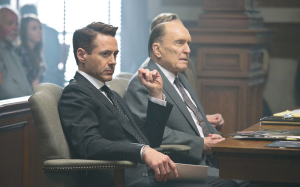
Robert Downey Jr. and Robert Duvall star in new courtroom drama “The Judge.”
★★★★☆
In theory, the lawyer and the judge are both tightly bound by their role in interpreting and doing justice under the law as they stand on opposite sides of the wooden platform in a courtroom. They are certainly polar opposites in many ways, yet at the same time they are similar — just as long as you don’t forget who sits higher up.
“The Judge” puts this theory into practice and explores the very human dynamics behind our legal system.
The star-studded cast, which includes Robert Downey Jr., Robert Duvall, supporting actor Billy Bob Thornton and a cameo by Leighton Meester, comes together to produce a powerful narrative about a slickcity lawyer and a hardened old judge, but more notably about a father and his son.
Downey Jr. plays Hank Palmer, a defense attorney with an impressive law degree from Northwestern but a less than stellar distant past. After he learns of his mother’s passing from cancer, he is obligated to return to his home in the predictable, yet charming small town setting of Carlinville, Ind. Upon his arrival, Hank faces not only his haunting past, but even more terrifyingly, his family.
Hank’s verbal prowess and inside knowledge of law make him a dynamic lawyer. His home life however, is not nearly as put together: his wife is sick of his ridiculous work schedule and his 11-year-old daughter Laura craves her father’s attention.
Although the plotline is fairly cliche, Downey Jr.’s performance makes it realistic as he speeds out of his driveway and into the landscape of his past. It is reminiscent of Downey’s role as the infamous Tony Stark, a careless know-it-all who must learn to use his intelligence with wisdom and sympathy.
But what Hank doesn’t foresee is that his father, a well-respected judge of 42 years, is accused of murder and needs the best attorney money can buy. The trial that follows is a whirlwind of pride and prejudice that takes place more between the judge and the lawyer than the defendant and the jury.
The obvious and most intriguing aspect of the movie was the father-son dynamic between Hank and the judge. The judge is a classic old codger: a stickler for accuracy with a strong predilection for justice. He wants to leave behind a legacy consistent with those values, despite his fast-paced, city slicker son wanting him to squeeze his way out of jail time, as all the rest of his “guilty” clients do. The clash of old and new traditions is especially evident.
In some ways Hank and his father are polar opposites: the judge versus the lawyer, the honest versus the shameless. However, the two have more in common than meets the eye: both are stubborn as mules, fight hard for what they want, and are acutely self-aware almost to a fault. It is the similarities in personality and behavior that they share, along with their differences, that make their relationship so fascinating.
One minute they are at each other’s throats ready to fight, and the next they are having frank conversations about the past or chuckling about the utter ridiculousness of their circumstances. They are similar in so many ways that they simply cannot coexist without somehow finding a compromise.
The movie relied heavily on classic Hollywood cliches to develop its story. A decent chunk of the lines were so predictable I could mouth them before they were even said, and much of the plot was similar to that of classic legal movies such as “A Few Good Men.” It follows a major trial full of supposedly unexpected twists and turns with an even more improbable yet completely predictable verdict.
In addition to some anticipated and seemingly forced insertions of humor, the film also fell victim to other cheesy Hollywood sentiments like the rekindling of a high school romance between Hank and his small-town ex-girlfriend Samantha and a violent hurricane during which Hank and the judge finally hash out the reasons for their estrangement between screams of insults.
Even with “The Judge’s” shortcomings, I still felt as though I had seen something truly complex. Each character’s role was well-developed and added dimension to their stereotypical selves. Duvall is the perfect intimidating old man who is stuck in his ways and obsesses over the preservation of his life’s work. Robert Downey Jr. gave one of the best performances of his career: Quick, smart and sarcastic, he brought the nuanced yet lovable character of Hank Palmer to life in an impeccably believable way.
As the credits rolled at the end of the film screening, director David Dobkin made a brief appearance to answer a few questions. Interestingly enough, Dobkin is from Bethesda, Md., making him a regular hometown hero.
He used his own experience to inspire parts of the film, such as Leighton Meester’s character Carla, who attends Georgetown University and even some of the father-son issues, though he chuckled saying that his relationship with his father was “nothing nearly as bad as the judge’s with his son.”
Prepare yourself for 141 minutes of ups and downs, nuanced humor and a family with even more problems than your own, because “The Judge” is all of that and more, and definitely worth the watch.



















